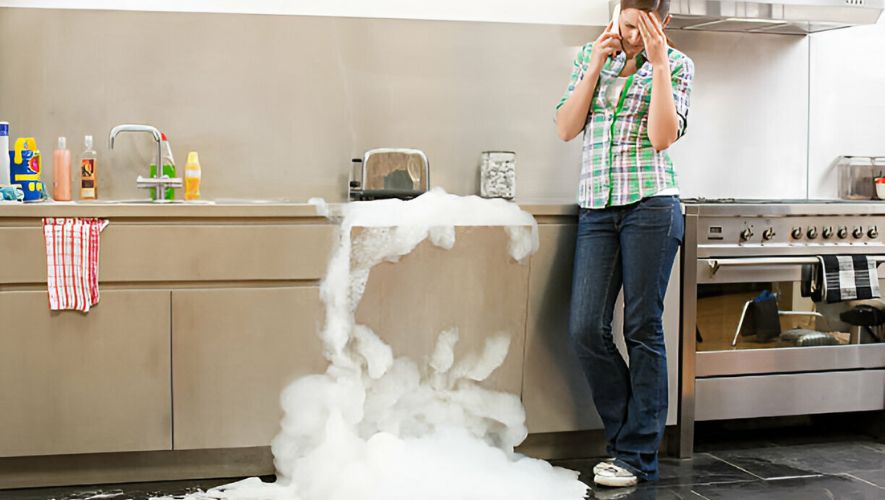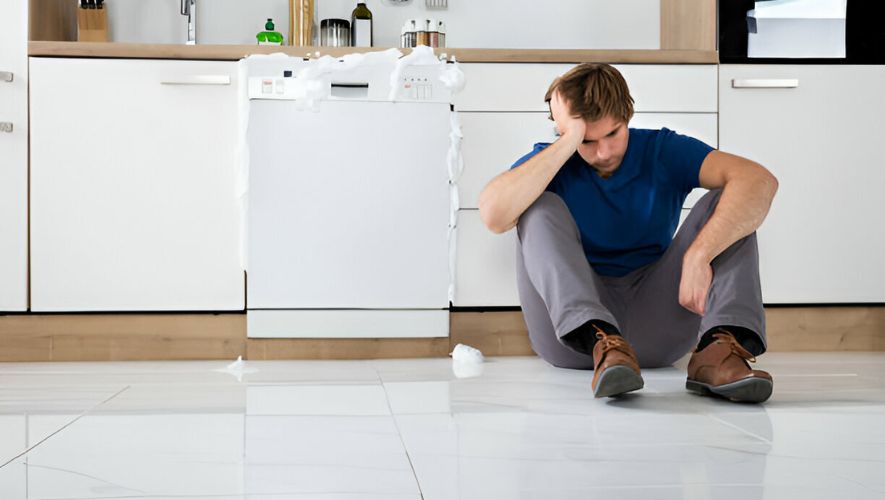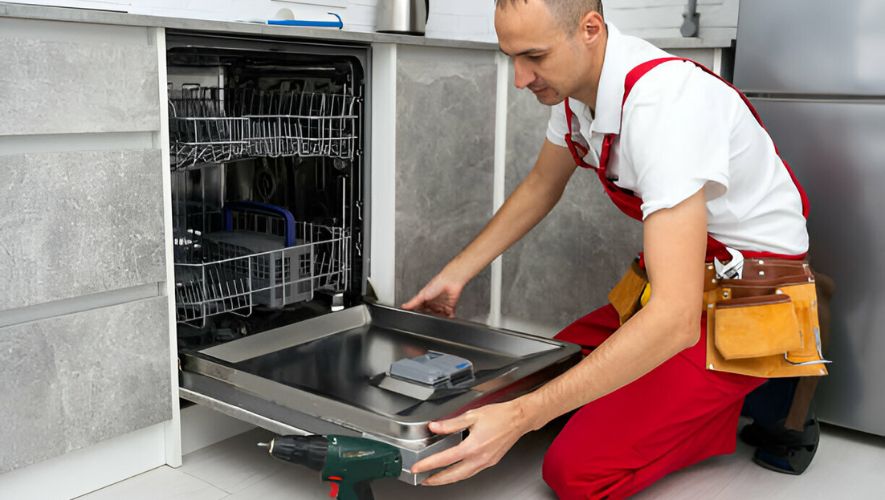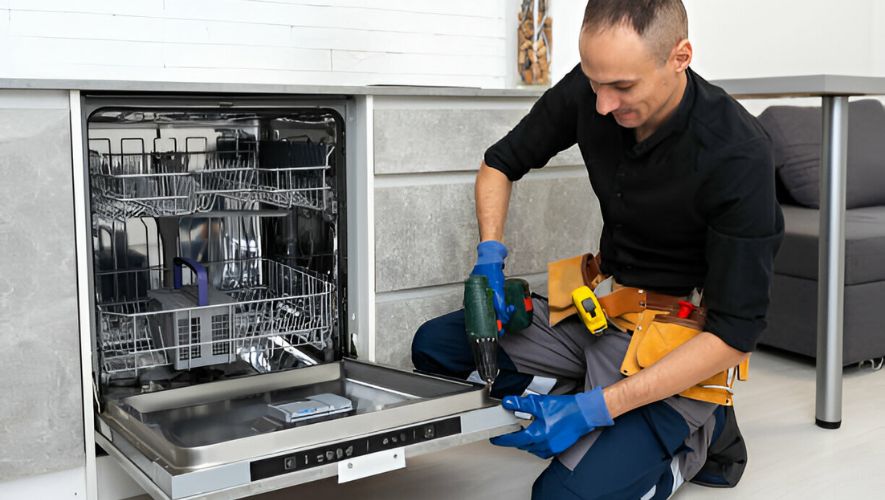
A dishwasher overflowing into the sink can be a frustrating and messy problem. This issue often signals underlying problems that need immediate attention to prevent further complications. In this comprehensive guide, we’ll explore the various causes of dishwasher overflow into the sink, how to address these issues, and tips for preventing them in the future.
Common Causes of Dishwasher Overflow into Sink

Clogged Drainage System
One of the primary reasons for dishwasher overflow is a clogged drainage system. When food particles, grease, or other debris accumulate in the dishwasher drain or garbage disposal, water flow is restricted, causing it to back up into the sink.
Garbage Disposal Issues
If the garbage disposal is not functioning correctly, it can lead to water backing up into the dishwasher. Blockages in the disposal or a failure to properly clean it can contribute to this problem.
Improper Dishwasher Installation
A poorly installed dishwasher can cause water to overflow into the sink. Issues such as an incorrectly positioned drain hose or a lack of an air gap can disrupt the normal water flow, leading to overflow.
Air Gap Blockage
The air gap is a small device installed above the sink that prevents dirty water from siphoning back into the dishwasher. If the air gap is blocked, water cannot drain properly, causing overflow.
Faulty Dishwasher Parts
Broken or malfunctioning parts within the dishwasher, such as the pump, can result in improper drainage and water overflow.
Diagnosing the Problem

Check for Clogs
Start by checking for clogs in the drain hose, garbage disposal, and air gap. Remove any visible debris and flush the system with hot water to clear minor blockages.
Inspect the Garbage Disposal
Ensure the garbage disposal is clear of any obstructions. Run the disposal to check for proper operation and clean it thoroughly if necessary.
Examine the Drain Hose
Look for kinks or bends in the drain hose that could impede water flow. Ensure the hose is properly connected and positioned above the sink level to prevent backflow.
Assess the Air Gap
Remove the air gap cover and clean out any debris. Ensure the air gap is functioning correctly to allow proper drainage.
Solutions to Prevent Dishwasher Overflow

Regular Maintenance
Perform regular maintenance on your dishwasher, garbage disposal, and air gap to prevent clogs. Clean these components periodically to ensure smooth operation.
Proper Dishwasher Installation
Ensure your dishwasher is installed correctly. Check the positioning of the drain hose and the presence of an air gap or high loop to prevent backflow.
Use of Dishwasher Safely
Avoid overloading the dishwasher with food particles and ensure dishes are properly rinsed before loading. This reduces the risk of clogs in the drainage system.
Cleaning Products
Use appropriate cleaning products designed for dishwashers to help break down food particles and grease, preventing clogs.
Preventive Measures

Routine Inspections
Regularly inspect your dishwasher and its components for signs of wear or damage. Replace any faulty parts promptly to avoid potential overflow issues.
Proper Use of Garbage Disposal
Run the garbage disposal before using the dishwasher to ensure it is clear of any food debris that could cause blockages.
Avoid Harsh Chemicals
Refrain from using harsh chemicals to clear clogs, as they can damage the dishwasher’s internal components. Opt for natural or dishwasher-safe cleaners.
Professional Assistance
Seek professional assistance if you’re unable to diagnose or fix the problem yourself. A qualified technician can identify and resolve complex issues effectively.
Conclusion
Understanding why your dishwasher overflows into the sink and knowing how to address the issue is essential for maintaining a functional and efficient kitchen. By identifying the common causes, diagnosing the problem accurately, and implementing preventive measures, you can ensure your dishwasher and sink operate smoothly. Regular maintenance and proper use are key to preventing future overflow issues, keeping your kitchen clean and hassle-free.
Frequently Asked Questions
Why is My Dishwasher Overflowing Into the Sink?
Dishwasher overflow into the sink typically occurs due to clogs in the drainage system, garbage disposal issues, improper installation, or faulty dishwasher parts.
How Can I Prevent My Dishwasher From Overflowing Into the Sink?
Regular maintenance, proper dishwasher use, ensuring correct installation, and routine inspections can help prevent overflow issues.
What Should I Do if My Dishwasher is Overflowing Into the Sink?
Check for clogs in the drain hose, garbage disposal, and air gap. Clean these components and ensure the drain hose is correctly positioned. Seek professional help if necessary.
Can a Clogged Garbage Disposal Cause Dishwasher Overflow?
Yes, a clogged garbage disposal can restrict water flow, causing it to back up into the dishwasher and overflow into the sink.
Is It Safe to Use Chemical Drain Cleaners to Fix Dishwasher Overflow?
No, using harsh chemical drain cleaners can damage the dishwasher’s components. Opt for natural or dishwasher-safe cleaning products instead.
